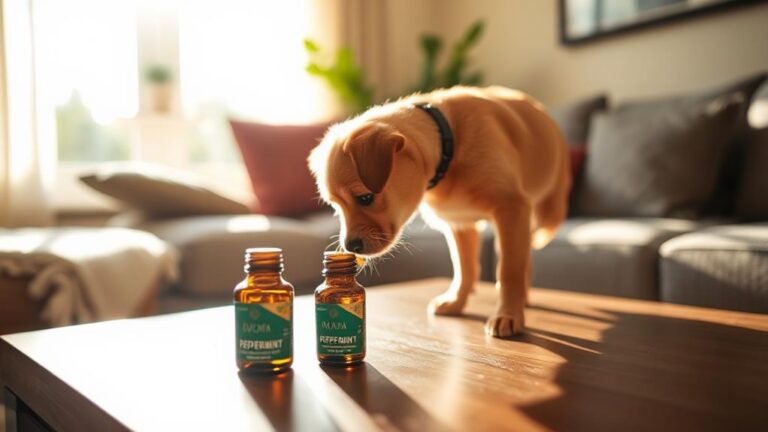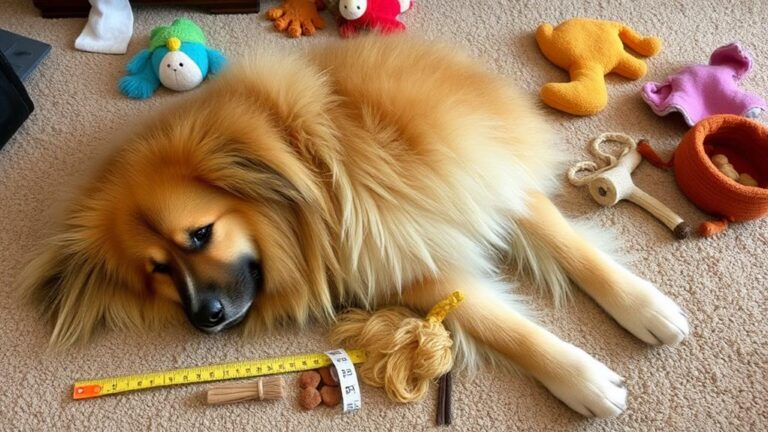Yes, the smell of peppermint oil can hurt dogs. Essential oils like peppermint are strong and can cause breathing problems for your pet. You might notice your dog coughing, sneezing, or acting tired. In some cases, peppermint oil can even lead to vomiting or more serious issues like liver failure. It's important to keep your pup away from strong scents and to be cautious with any mint products. If your dog shows any strange symptoms, it's best to contact your vet right away. There are safer alternatives and other choices you can learn about for your dog's health.
Understanding Peppermint Oil Toxicity
Understanding the toxicity of peppermint oil is vital for pet owners. Many people think essential oils are safe, but peppermint oil can harm your dog.
It's important to highlight that strong oils can cause breathing issues in dogs, leading to coughing or sneezing, and peppermint is one of the more serious offenders. Toxicity can cause serious problems like lethargy, vomiting, and even liver failure in dogs.
Additionally, peppermint in its herb form is also toxic. You'll want to be careful about using peppermint products in your home. Always read labels and choose pet-friendly alternatives, such as safe essential oils.
Symptoms of Peppermint Exposure
What signs should you look for if your dog is exposed to peppermint? It's important to watch for symptoms right away. If your dog has a negative reaction, you might notice:
- Lethargy: Your dog may seem tired and less active than usual. This can be exacerbated by strong scents that may cause anxiety or discomfort in some dogs, as seen with other essential oils like lavender a calming aroma for dogs.
- Vomiting: You may see your dog vomit or have an upset stomach.
- Drooling: Excessive drooling can be a sign of distress.
- Difficulty Breathing: If your dog struggles to breathe, that's serious and needs immediate help.
If you observe any of these symptoms, it's crucial to contact your veterinarian quickly. The sooner you act, the better the chance of keeping your furry friend safe and healthy.
Identifying Safe Mint Varieties
Knowing how to identify safe mint varieties is important for your dog's health, especially after discussing the signs of peppermint exposure. Not all mints are safe!
You should look for wild mint and spearmint, which are nontoxic to dogs. These plants can be safe if given in small amounts. However, be careful not to confuse them with English pennyroyal. This variety is toxic and harmful.
To guarantee your dog's safety, double-check the mint's name before introducing it to their diet. Always remember that even safe mints should be given in moderation. Too much can cause upset stomachs.
Keep your dog's well-being in mind, and you'll be on the right track to a safe and happy experience!
Essential Oils Safe for Dogs
When it comes to essential oils and your furry friend, choosing the right ones can make all the difference. Some oils are safe for dogs and can even benefit them.
It's important to know which ones to use. Here's a list of essential oils that are generally safe for dogs:
- Cedarwood oil: This oil can help keep bugs away and is safe for your dog.
- Chamomile oil: It may soothe your dog's tummy troubles and is calming.
- Citrus oils: Lemon and orange oils can repel mosquitoes and freshen the air.
- Eucalyptus oil: This oil is often considered safe and may help with breathing.
Always check with your vet before using any oils to guarantee your dog stays healthy!
Peppermint's Effects on Dog Health
Although peppermint can provide some benefits, its effects on your dog's health should be carefully considered. Small amounts of peppermint may help soothe nausea and an upset stomach.
However, too much can cause serious problems, like liver and kidney damage. You should avoid giving peppermint oil to your dog, as it can be toxic. If your dog accidentally eats too much, look out for signs like vomiting or lethargy.
Remember, even in herb form, peppermint can be a risk. While spearmint may freshen your dog's breath, giving them too much can lead to diarrhea.
Always be cautious and monitor your dog when trying any new food or herb. Keep portion control in mind, and consult your vet if you're unsure.
Best Practices for Usage
To safely incorporate peppermint or similar herbs into your dog's diet, focus on moderation and careful monitoring. Here are some best practices you should follow:
- Introduce Slowly: Start with a tiny amount of peppermint to see how your dog reacts.
- Watch for Symptoms: Keep an eye out for any signs of upset stomach or other reactions.
- Use Safe Forms: Choose fresh mint leaves or dried herbs instead of essential oils, which can be harmful.
- Consult Your Vet: Always ask your veterinarian before adding peppermint or any new herb to your dog's diet.
Conclusion
To summarize, peppermint oil can be harmful to dogs. Its strong scent and concentrated form can cause serious health issues. Make sure to keep your pup away from peppermint oil and be cautious with any essential oils around them. Instead, consider safe mint varieties or other dog-friendly scents. Always check before introducing new smells into your pet's space. Keeping your dog safe and healthy is the most important thing you can do as a responsible pet owner.



